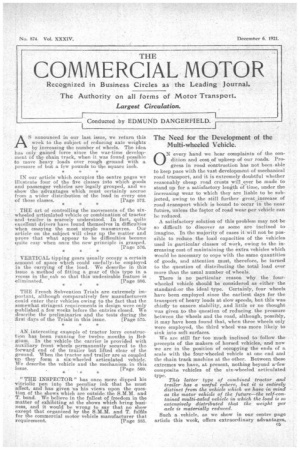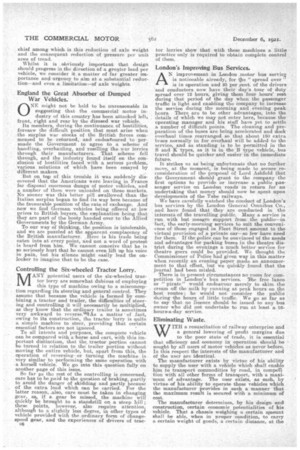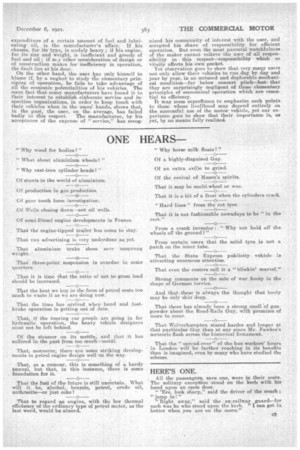The Need for the Development of the Multi-wheeled Vehicle.
Page 1

Page 2

Page 3

If you've noticed an error in this article please click here to report it so we can fix it.
N every hand we bear complaints of the con dition and caist.of upkeep of our roads. Pro'.
gross in road construction has not been able to keep pace with the inlet development of mechanical road transport, and it is extremely doubtful whether reasonably cheap road crusts will ever be made to stand. up for a satisfactory length Of time, under the increasing wear to which they are liable to be subjected, owing to the still further great,,inerease of road .transport which is bound to occur in the near future, unless the factor of road wear per vehicle can be reduced.
A satisfactory solution of this problem may not be so difficult to discover as some are inclined to imagine. In the majority of cases it will not "be possible to reduce the load capacities of the -vehicles used in particulai. classes of work, owing to the increasing cost of maintaining the extra vehicles which would be necessary to cope with the same quantities of goods, and attention must, therefore, be turned to the question of distributing the total load over more than the usual number of wheels.
There is no particular reason why the fourwheeled vehicle should be considered as either the standardeor the ideal type. Certainly, four wheels have been employed since the earliest days for the transport of heavy loads at slow speeds, but this was chiefly to ensure stability, and little or no thought was given to the question of reducing. the pressure between the wheels and the road, although, possibly, it may have been found that, when three wheels only were employed, the third wheel was more likely. to sink into soft surfaces.
We are till far too much inclined to follow the precepts of the makers of horsed vehicles, and now we are in the position of occupying the ends of a scale with the four-wheeled vehicle at one end and the chain track machine at the other. Between these extremes we have, at present, nothing beyond aefew composite vehicles of the six-wheeled, articulated type. This latter type of combined tractor and trailer has a useful spheret but it is entirely distinct from the vehicle which we have in mind as the motor vehicle of the future—the self-contained multi-aided vehicle in which the load is so extensively distributed that the weight per axle is materially reduced.
Such a vehicle, as we show in our centre page article this week, offers extraordinary advantages, . chief among which is this reduction of axle weight and the consequent reduction of pressure per unit area of tread.
Whilst it is obviously important that design should progress in the direction of a greater load per vehicle, we consider it a matter of far greater importance and -urgency to aim at a substantial reduction—and even a limitation—of axle weights.
England the Great Absorber of Dumped War Vehicles.
0 NE might not be held to be unreasonable in suggesting that the commercial motor industry of this country has been attacked left, front, right and rear by the disused war vehicle.
Its members, during the continuance of hostilities, foresaw the difficult position that must arise when the surplus war stocks of the British forces commenced to be returned, and endeatoured to persuade the Government to agree to a scheme of handling, overhauling, and reselling the war lorries through their manufacturers. That scheme fell through, and the industry found itself on the conclusion of hostilities faced with a serious problem, various solutions of which have been essayed by different makers.
But on to of this trouble it was suddenly discovered that the Americans were leaving in France for disposal enormous dumps of motor vehicles, and a number of them were unloaded on these markets. No sooner was this bitter pill swallowed than the Italian surplus began to find its way here because of the favourable position of the rate of exchange. And now we find German vehicles being offered at low prices to British buyers, the explanation being that they are part of the booty handed over to the Allied Governments by the German Army. To our way of thinking, the position is intolerable, and we are puzzled at the apparent complacency of the British manufacturer. Here is his trade being eaten into at every point, and not a word of protest is heard from him. We cannot conceive that he is m seriously hurt that he cannot even lift up his voice in pain, but his silence might easily lead the onlooker to imagine that to be the case.
Controlling the Six-wheeled Tractor Lorry.
MANY potential users of the six-wheeled tractor lorry are somewhat dubious of employing this type of machine owing to a misconception regardingits steering and general control. They assume that because the vehicle is formed by combining a tractor and trailer, the difficulties of steering and controlling it will necessarily be multiplied, as they know that the ordinary trailer is sometimes very awkward to reverse.*Ms a matter 'of fact, owing to its construction, the tractor lorry is quite a simple machine to steer, providing that certain essential factors are not ignored.
To all intents and purposes, the complete vehicle can be compared with a horse and cart, with this important distinction, that the, tractor portion cannot be turned in relation to the trailer portion without moving the entire vehicle, but, apart from this, the operation of reversing or turning the machine is very similar to performing the same operation with a horse ll vehicle. We go into this question fully on another page of this issue. So far es the rest of the controlling is concerned, care has to bepaid to the question of braking, partly to avoid the danger of skidding and partly because of the extra load which can be carried. For the latter reason, .also, care must be taken in changing gear, as, if a gear be missed, the machine will quickly be brought to a standstill on a steep hill; these points, however, also require attention, although to a slightly less degree, in other types of vehicle provided with the ordinary form of changespeed -gear, and the experiences of drivers of trac e/3 tor lorries show that with these machines a little practice only is required to obtain complete control of therm
London's Improving Bus Services.
AN improvement in London motor bus service is noticeable already, for the " spread over is in operation and 25 per Dent, of the drivers and conductors now have their day's tour of duty spread over 12 hours giving them four hours' rest during that period of the day when the passenger traffic is light and enabling the company to increase the service during the morning and evening peak hours. There are to be other advantages, into the details of which we may not enter here, because the operating manager arid his staff have yet to settle a number of difficult points. The cleaning and preparation of the buses are being accelerated and dock overhaul times rearranged so that about 150 extra buses normally in for overhaul will be added to the service, and as standing is to be permitted in the S and K types, as it is in the B type vehiele, bus travel should be quicker and easier in the immediate future.
It strikes us as being unfortunate that no further move, at the moment, is being made to secure reconsideration of the proposal of Lord Ashfield that the Government should grant to the company the first options to provide or increase a public passenger service on London roads in return for an undertaking that money should now be spent upon developments of the Tube railways. We have carefully watched the conduct of London's bus services by the London General Omnibus Co., and have found that they are conducted in the interests of the travelling public. Many a service is run with but meagre support from the public—in fact, the early-morning services to suit the convenience of those engaged in Fleet Street amount to the virtual provision of a private ear—so few have need for them. If the police can be convinced of the needs and advantages for parking buses in the theatre district during the evenings a much better service for theatre goers could be provided. We thought the Commissioner of Police had given way in this matter when recently an evening paper made an announcement to that effect,. but we quickly found that the journal had been misled.
There is in present circumstances no room for competition in London's bus services. The free lance or "pirate" would endeavour merely to skim the cream off the milk by running at peak hours on the best routes ; he would not consider the public during the hours of little traffic. We go so far as to say that no licence should be issued to any bus owner who did not undertake to rim at least a 16hour s-a-day service.
Eliminating Waste.
WITH a resuscitation of railway enterprise and a general lowering of profit margins due to the poor state of trade, it is essential that efficiency and economy in operation should he sought by all users of motor vehicles as never before. In this respect the. interests of the manufacturer arid of the user are identical.
The manufacturer exists by virtue of his ability to supply the user with a vehicle which shall enable him to transport commodities by road, in compefi tion with all other forms of transport, with a maximum of advantage. The user exists, as such, by virtue of his ability to operate those vehicles which the manufacturer provides in such a manner that the maximum result is secured with a minimum of cost.
The manufacturer determines, by his design and construction, certain economic potentialities of his vehicle. That a chassis weighing a certain amount shall be able, when in proper condition, to carry a certain weight of goods, a certain distance, at the expenditure of a certain amount of fuel and lubricating oil, is the manufacturer's affair. If his chassis, for its type, is unduly heavy; if his engine, for its size and weight, is inefficient and greedy of fuel and oil ; if ai y other consideration of design or of construction makes for inefficiency in operation, the fault lies at his door.
On the other hand, the user has only himself to blame if, by a neglect to study the elementary principles of operation, he fails to take advantage of all the economic potentialities of his vehicles. The mere fact that many manufacturers have found it to their. interest to establish elaborate service and inspection organizations, in order to keep touch with their vehicles when in the users' hands, shows that, in the past, the user, on the average, has failed badly in this respect. The manufacturer, by his acceptance of the expense of "service," has recog nized his community of interest with the user, and accepted his share of responsibility for efficient operation. But even the most parental watchfulness of the maker cannot relieve the user of all responsibility in this respect—responsibility which so vitally affects his own pocket. Yet observation goes to show that very many users not only allow their vehicles to run day by day and year by year, in an untuned and deplorable mechanical condition—far below concert pitch—but • that they are surprisingly negligent of those elementary principles of economical operation which are essential to efficiency. It may seem superfluous to emphasize such points to those whose livelihood may depend entirely on the successful use of the motor vehicle, yet our experience goes to show that their importance is, as yet, by no means fully realized.
































